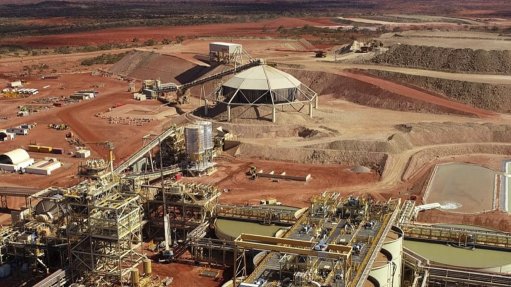Africa making better use of resources – GGA
Across Africa, governments are making better use of their natural resources, including base metals resources, states research and advocacy organisation Good Governance Africa (GGA) CEO John Endres.
His view is reflected in financial services provider Barclays Capital’s latest Metals Magnifier publication, which expects supply growth for all the base metals, apart from nickel, to increase significantly in 2013, with an average growth of 4.3% this year, compared with 1.2% last year.
Endres points out that the creation of sovereign wealth funds (SWFs) is an evident trend across Africa. “When such funds are transparently and professionally managed, they preserve a portion of resource revenues for future generations.”
These funds can also help insulate the economy from the harmful effects of Dutch disease – currency appreciation, which makes local industry uncompetitive – and market price fluctuations. Income can also be generated, which funds investment into infrastructure, health and education, he notes.
Angola, Ghana and Nigeria launched such funds in 2012, rendering the amount of African SWFs close to 20, the African Development Bank reported in January.
Corruption Watch
“Unfortunately, African funds are not managed according to high standards of transparency and accountability, which means there is considerable risk that their potential benefits are not fully realised,” Endres states.
While the base metals growth from the Copperbelt, in Ghana, and the Democratic Republic of Congo (DRC), is expected to cause an African boom in future, the DRC ranks 168 out of 182 countries on Transparency International’s Corruption Perceptions Index 2011, with Zambia, also a significant copper producer, ranking at 91, GGA reports.
Initiatives, such as the Extractive Industries Transparency Initiative (EITI), are urging governments to increase transparency and accountability regarding the use of revenue generated from natural resources.
“The EITI certifies countries as being EITI compliant when, in a particular country, companies publish what they pay government for the resources they extract and government publishes what it receives from companies. More than half of the world’s EITI-compliant countries are in Africa,” he states.
Endres notes, however, that corruption is still rampant across the continent. “Nigeria is losing staggering amounts of money generated by oil to corruption, which could be much better spent on improving infrastructure, especially power generation and distribution.
“The UK Guardian newspaper reported last year that Nigeria had, as a conservative estimate, lost $35-billion to corruption over the preceding ten years – more than a year’s entire Budget,” he stresses.
South Africa Could Benefit More
“South Africa is spending significant amounts of money on education, health and infrastructure, which should boost productivity. The problem is that the results of all the spending are sorely disappointing,” says Endres.
The country was ranked 140 out of 144 countries with regard to education, according to information published by the World Economic Forum. “Public health services are in a state of collapse in parts of the country, with concerns about the effectiveness and pace of infrastructure spending,” he points out.
In June 2012, Minister in the Presidency responsible for the National Planning Commission Trevor Manuel told the media that large sums allocated by government for infrastructure were routinely rolled over each year, owing to a lack of capacity to get projects off the ground.
In addition, South Africa may not be fully benefiting from its base metals, among other resources, owing to investor uncertainty. “The onerous and shifting regulatory environment, labour relations and South Africa’s public finances make investors wary,” Endres notes.
“Consequently, South Africa did not benefit from the past decade’s booming demand for natural resources. In the Canadian Fraser Institute’s International 2Policy Potential Index, which measures the attractiveness of different mining countries or jurisdictions to investors, South Africa fell from 54 out of 93 in the 2011/12 ranking to 64 out of 96 in the 2012/13 ranking.”
Comments
Press Office
Announcements
What's On
Subscribe to improve your user experience...
Option 1 (equivalent of R125 a month):
Receive a weekly copy of Creamer Media's Engineering News & Mining Weekly magazine
(print copy for those in South Africa and e-magazine for those outside of South Africa)
Receive daily email newsletters
Access to full search results
Access archive of magazine back copies
Access to Projects in Progress
Access to ONE Research Report of your choice in PDF format
Option 2 (equivalent of R375 a month):
All benefits from Option 1
PLUS
Access to Creamer Media's Research Channel Africa for ALL Research Reports, in PDF format, on various industrial and mining sectors
including Electricity; Water; Energy Transition; Hydrogen; Roads, Rail and Ports; Coal; Gold; Platinum; Battery Metals; etc.
Already a subscriber?
Forgotten your password?
Receive weekly copy of Creamer Media's Engineering News & Mining Weekly magazine (print copy for those in South Africa and e-magazine for those outside of South Africa)
➕
Recieve daily email newsletters
➕
Access to full search results
➕
Access archive of magazine back copies
➕
Access to Projects in Progress
➕
Access to ONE Research Report of your choice in PDF format
RESEARCH CHANNEL AFRICA
R4500 (equivalent of R375 a month)
SUBSCRIBEAll benefits from Option 1
➕
Access to Creamer Media's Research Channel Africa for ALL Research Reports on various industrial and mining sectors, in PDF format, including on:
Electricity
➕
Water
➕
Energy Transition
➕
Hydrogen
➕
Roads, Rail and Ports
➕
Coal
➕
Gold
➕
Platinum
➕
Battery Metals
➕
etc.
Receive all benefits from Option 1 or Option 2 delivered to numerous people at your company
➕
Multiple User names and Passwords for simultaneous log-ins
➕
Intranet integration access to all in your organisation

















